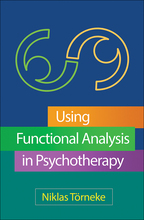Using Functional Analysis in Psychotherapy
Niklas Törneke
Foreword by Stefan G. Hofmann
HardcoverPaperbacke-bookprint + e-book
Hardcover
orderFebruary 14, 2025
ISBN 9781462556908
Price: $57.00 144 Pages
Size: 6" x 9"
Paperback
orderJanuary 20, 2025
ISBN 9781462556182
Price: $38.00144 Pages
Size: 6" x 9"
e-book
orderJanuary 29, 2025
PDF and Accessible ePub ?
Price: $38.00 144 Pages
ePub is Global Certified Accessible
print + e-book $76.00 $45.60
orderPaperback + e-Book (PDF and Accessible ePub) ?
Price: 144 Pages
ePub is Global Certified Accessible
Sign up for emails on upcoming titles on Dialectical Behavior Therapy (with special discounts)!
“Modern learning theory is put to practical use in this essential guide for any therapist looking to foster real and meaningful change. Using Functional Analysis in Psychotherapy brilliantly outlines a unifying approach that moves away from the traditional disease model, instead inviting therapists to see the individual human being and their unique way of living in the world. The book focuses on how collaboration between therapist and client is the key to transformation. I will be recommending this book to all therapists wishing to be guided by principles—not just diagnoses—in their efforts to support clients in living healthy lives.”

—Robyn D. Walser, PhD, private training, consultation, and psychotherapy practice, Menlo Park, California; Co-Director, Bay Area Trauma Recovery Clinical Services
“FA is one of the most powerful tools of behavior change available to therapists, but it can feel tricky to fluidly incorporate into therapeutic conversation. Perhaps no one writes more clearly about behavioral psychology than Tӧrneke, and Using Functional Analysis in Psychotherapy is a gift to therapists. Tӧrneke skillfully unpacks the process of FA and contextualizes it into the ongoing process of the therapeutic interaction. Particularly useful are the frequent depictions of therapeutic exchanges that make crystal clear what this strategy could look like in therapy. This book would be a valuable addition to courses in behavior therapy. It is a fantastic resource for all therapists interested in helping clients understand and change their behavior—which is to say, all therapists.”

—Russell L. Kolts, PhD, Department of Psychology, Eastern Washington University
“It is indeed a treat to be invited into the thinking process and therapy sessions of a truly gifted clinician. This book is an engrossing read, incorporating principles of FA and relational frame theory into the back-and-forth of clinical conversations. I will use this book in my work with psychiatry residents and when training or consulting with any clinician. Even as an experienced clinician, I learned a great deal from this book, finding that I thought and behaved differently with my patients based on what I had just read. This book is a triumph. It is elegantly written, thoughtful, and full of heart.”

—Barbara Kohlenberg, PhD, Department of Psychiatry and Behavioral Sciences and Department of Family and Community Medicine, University of Nevada, Reno, School of Medicine
“FA is one of the most powerful tools for change that can be found across the evidence-based psychotherapies. Unfortunately, accounts of FA can be either too vague or too technical. This book is a godsend for therapists who wish to master using this highly effective tool.”

—Dennis Tirch, PhD, Center for Compassion Focused Therapy, New York City
—Robyn D. Walser, PhD, private training, consultation, and psychotherapy practice, Menlo Park, California; Co-Director, Bay Area Trauma Recovery Clinical Services
“FA is one of the most powerful tools of behavior change available to therapists, but it can feel tricky to fluidly incorporate into therapeutic conversation. Perhaps no one writes more clearly about behavioral psychology than Tӧrneke, and Using Functional Analysis in Psychotherapy is a gift to therapists. Tӧrneke skillfully unpacks the process of FA and contextualizes it into the ongoing process of the therapeutic interaction. Particularly useful are the frequent depictions of therapeutic exchanges that make crystal clear what this strategy could look like in therapy. This book would be a valuable addition to courses in behavior therapy. It is a fantastic resource for all therapists interested in helping clients understand and change their behavior—which is to say, all therapists.”
—Russell L. Kolts, PhD, Department of Psychology, Eastern Washington University
“It is indeed a treat to be invited into the thinking process and therapy sessions of a truly gifted clinician. This book is an engrossing read, incorporating principles of FA and relational frame theory into the back-and-forth of clinical conversations. I will use this book in my work with psychiatry residents and when training or consulting with any clinician. Even as an experienced clinician, I learned a great deal from this book, finding that I thought and behaved differently with my patients based on what I had just read. This book is a triumph. It is elegantly written, thoughtful, and full of heart.”
—Barbara Kohlenberg, PhD, Department of Psychiatry and Behavioral Sciences and Department of Family and Community Medicine, University of Nevada, Reno, School of Medicine
“FA is one of the most powerful tools for change that can be found across the evidence-based psychotherapies. Unfortunately, accounts of FA can be either too vague or too technical. This book is a godsend for therapists who wish to master using this highly effective tool.”
—Dennis Tirch, PhD, Center for Compassion Focused Therapy, New York City



